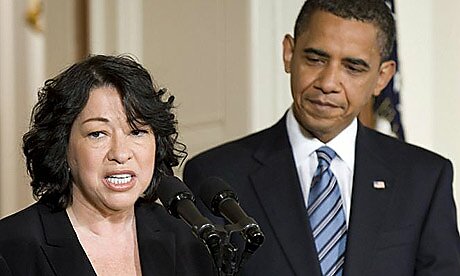Obama Picks Sotomayor for Supreme Court
President Obama chose federal Judge Sonia Sotomayor on Tuesday as his nominee for the U.S. Supreme Court, the first Hispanic Latina to serve on the bench.
On Cato’s blog, constitutional law scholar Roger Pilon wrote, “President Obama chose the most radical of all the frequently mentioned candidates before him.”
Cato Supreme Court Review editor and senior fellow Ilya Shapiro weighed in, saying, “In picking Sonia Sotomayor, President Obama has confirmed that identity politics matter to him more than merit. While Judge Sotomayor exemplifies the American Dream, she would not have even been on the short list if she were not Hispanic.”
Shapiro expands his claim that Sotomayor was not chosen based on merit at CNN.com:
In over 10 years on the Second Circuit, she has not issued any important decisions or made a name for herself as a legal scholar or particularly respected jurist. In picking a case to highlight during his introduction of the nominee, President Obama had to go back to her days as a trial judge and a technical ruling that ended the 1994–95 baseball strike.
Pilon led a live-chat on The Politico’s Web site, answering questions from readers about Sotomayor’s record and history.
And at The Wall Street Journal, Cato senior fellow John Hasnas asks whether “compassion and empathy” are really characteristics we want in a judge:
Paraphrasing Bastiat, if the difference between the bad judge and the good judge is that the bad judge focuses on the visible effects of his or her decisions while the good judge takes into account both the effects that can be seen and those that are unseen, then the compassionate, empathetic judge is very likely to be a bad judge. For this reason, let us hope that Judge Sotomayor proves to be a disappointment to her sponsor.
North Korea Tests Nukes
The Washington Post reports, “North Korea reportedly fired two more short-range missiles into waters off its east coast Tuesday, undeterred by the strong international condemnation that followed its detonation of a nuclear device and test-firing of three missiles a day earlier.”
Writing in the National Interest online, Cato scholar Doug Bandow discusses how the United States should react:
Washington has few options. The U.S. military could flatten every building in the Democratic People’s Republic of Korea (DPRK), but even a short war would be a humanitarian catastrophe and likely would wreck Seoul, South Korea’s industrial and political heart. America’s top objective should be to avoid, not trigger, a conflict. Today’s North Korean regime seems bound to disappear eventually. Better to wait it out, if possible.
On Cato’s blog, Bandow expands on his analysis on the best way to handle North Korea:
The U.S. should not reward “Dear Leader” Kim Jong-Il with a plethora of statements beseeching the regime to cooperate and threatening dire consequences for its bad behavior. Rather, the Obama administration should explain, perhaps through China, that the U.S. is interested in forging a more positive relationship with [the] North, but that no improvement will be possible so long as North Korea acts provocatively. Washington should encourage South Korea and Japan to take a similar stance.
Moreover, the U.S. should step back and suggest that China, Seoul, and Tokyo take the lead in dealing with Pyongyang. North Korea’s activities more threaten its neighbors than America. Even Beijing, the North’s long-time ally, long ago lost patience with Kim’s belligerent behavior and might be willing to support tougher sanctions.
Cato Media Quick Hits
Here are a few highlights of Cato media appearances now up on Cato’s YouTube channel:
- Ted Galen Carpenter discuss the North Korean missile tests on WOR radio.
- On Fox News, Chris Edwards disputes the idea of a federal sales tax.
- Gene Healy comments on the future of Guantanamo detainees on BBC.
- On CNBC, Dan Mitchell explains why California is like the “France of America.”
- In Friday’s Cato Daily Podcast, John Samples discusses how at least three presidents used the Fairness Doctrine to squelch dissenting speech.

